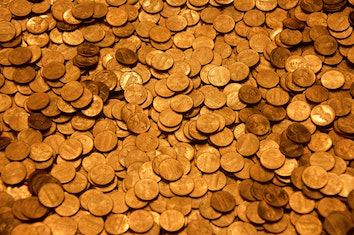
Hoard and horde: two words with similar but distinct and different meanings. Hoard is the word used more frequently, particularly since COVID-19 swept over the world, which is possibly why it is sometimes used instead of horde.
Hoard has traditionally meant a collection of valuable goods, usually gold, particularly coins, and jewellery. A hoard thus tends to be something collected over time, with considerable effort. Hoards are not generally kept in neat, measurable units but in one large mass. A squirrel’s store of nuts and food for the winter is a classic example of a hoard. In stories, hoards are particularly associated with pirates and dragons, meaning that there tends to be an implication that a hoard had probably been gathered through robbery or some other illegal means. (The tradition of dragons having a hoard of gold comes from Scandinavian folklore, which in turn inspired J.R.R. Tolkien in his works.)

These days, hoard is often used more generally for any large, disorganised collection that has been built up over time. Psychologists have come to recognise hoarding as a disorder that some people have, meaning that where they live can become overwhelmed with newspapers, cats or just any kinds of items, sometimes even rubbish. People who live in this way are sometimes called hoarders. The word hoarder can also be used to describe anyone who tends to hold on to objects without an immediate use. At the beginning of the COVID-19 pandemic this year, people in many countries hoarded toilet paper, fearing that supplies would run out or that they would not be able to shop.

So much for hoard: what then is a horde? A horde is a large group of people, particularly a mob or other disorganised group of people intending violence. It is very often used in plural form:
- In the final battle of The Lord of the Rings, Aragorn’s army confronts hordes of orcs.
While hordes is still often used in this military sense, it also fine to use it for any large crowd of people where your intention is convey some criticism of the group.
- Hordes of tourists usually descend on coastal towns in the summer.

Hordes can also be made of animals, again often if they can be seen as having a malign intention:
- Hordes of cockroaches scurried away when the light was turned on.
In summary, a hoard is a disorganised collection of precious objects. A horde is a disorganised group of people, who may be violent.

If you have found this post interesting, you can find a full index to my other posts on the index page. To be notified when I post a new topic, follow me on Facebook! If you have any particular questions you’d like me to answer in future posts, just send me a message. I’m always interested to learn what people think, and how you came across this site, so please post a comment.
If you think you would be interested in either my complete grammar course or an individual customised online course (particularly suited for people who don’t live in Melbourne), just click your preferred option.
Photos: squirrel by Robert Thiemann, coins by Dan Dennis, toilet paper hoarder by Engin Akyut and crowd of people by Chuttersnap, all on Unsplash
2 comments on “Commonly confused words: hoard and horde”